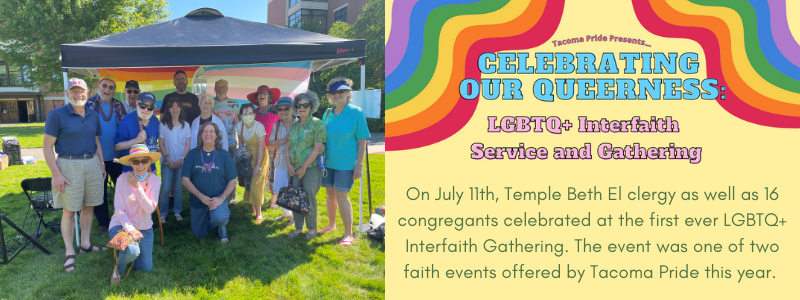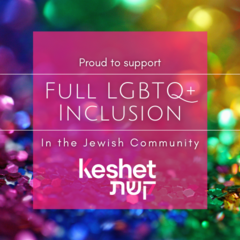Coming Out or Transitioning
Coming Out or Transitioning
Affirming one’s sexual identity is an important event in one’s life and can be celebrated in the Jewish community with appropriate blessings and rituals.
For more information, contact Rabbi Gorban at rabbigorban@tbetacoma.org or Cantor Fine at cantorfine@tbetacoma.org.

A Blessing for Transitioning Genders
From Rabbi Eli Kukla, 2006 via the URJ
Jewish tradition teaches us that we should be saying a hundred blessings a day to mark all the moments of kedusha, holiness, that infuse our lives. There are blessings to recite before eating and drinking, performing religious commandments, witnessing rainbows, oceans, thunder or lightning, seeing old friends, tasting new fruits and arriving at a new season. And yet many of the most important moments in the lives of transgender, intersex, and genderqueer Jews are not honored within our tradition.
In this piece there are several blessings written to mark moments of transitioning, such as name or pronoun changes, coming out to loved ones, or moments of medical transition.
These blessings were originally designed for someone who wanted to mark each time that he received testosterone (homone therapy). These blessings signal the holiness present in the moments of transitioning that transform Jewish lives and affirm the place of these moments within Jewish sacred tradition. Jewish sacred texts such as the Mishna, the Talmud, midrash, and classical legal codes acknowledge the diversity of gender identities in our communities despite the way that mainstream Jewish religious tradition has effaced the experiences of transgender, intersex, and genderqueer Jews.
The first blessing takes the same form and grammatical structure as classical blessings that mark wondrous occasions. "The Transforming One" as a name for God appears in the traditional blessings of gratitude that are recited each morning. The Hebrew verb root of this word, avar, has multiple layers of meaning within Judaism. Most literally it means to physically cross over, however it also implies spiritual transformation in High Holiday prayers. It lies at the root of the word Ivrim, Hebrew people. We are the Ivrim, the crossing over people, because we physically crossed over the Jordan River to escape from slavery and oppression and spiritually transformed ourselves. At its core, our ancestral sacred memory holds this moment of painful and yet redemptive physical and spiritual transition. In Modern Hebrew, this same verb root is used to form the word, ma'avar, which means to transition genders.
The second blessing is also taken from morning liturgy. It is based on the book of Genesis, which teaches that male and female bodies were equally created in God's image. The Midrash, classical Jewish exegesis, adds that the Adam HaRishon, the first human being formed in God's likeness, was an androgynous, intersex person. Hence our tradition teaches that all bodies and genders are created in God's image whether we identify as men, women, intersex, or something else. When we take physical or spiritual steps to more honestly manifest our gender identities we are fulfilling the foundational mitzvah, religious commandment, to be partnered with God in completing the work of creation.
The final blessing is classically recited each time we reach a new event or season. Saying it at moments of transition celebrates God's nurturing and sustaining presence in allowing us to reach this moment of self-transformation. However, this blessing is written in a plural form, and marks our collective transition as a people as we begin to transform our tradition in order to honor and celebrate the lives of transgender, intersex, and genderqueer Jews.
Blessings
This blessing may be recited before any moment in the transitioning process:
Baruch Ata Adonai Eloheinu Melech Ha'Olam; Ha'Ma'avir L'Ovrim.
Blessed are You, Eternal One, our God, Ruler of Time and Space; the Transforming One to those who transform/transition/crossover.
Afterwards recite:
Baruch Ata Adonai Eloheinu Melech Ha'Olam sh'asani b'tzelmo.
Blessed are You, Eternal One, our God, Ruler of Time and Space, who has made me in God's image
For special events taking place for the first time or for the first time in this season (such as a name or pronoun change, beginning hormone therapies, or surgeries) add:
Baruch Ata Adonai Eloheinu Melech Ha'Olam Sh'hechianu, v'kimanu, v'higiyanu, la'zman hazeh.
Blessed are You, Eternal One, our God, Ruler of Time and Space, who has kept us alive and sustained us and helped us to arrive at this moment.
Mon, April 29 2024
21 Nisan 5784
Today's Calendar
| Passover |
| Yizkor |
| TBE STAFF HOLIDAY |
: 10:00am |
Friday Night
: 5:30pm |
| Judaica Shop : 5:45pm |
: 6:30pm |
Shabbat Day
: 9:00am |
: 10:00am |
: 5:00pm |
Upcoming Programs & Events
Apr 29 |
Apr 30 |
May 1 |
May 1 |
May 1 |
This week's Torah portion is Parashat Acharei Mot
| Shabbat, May 4 |
Passover & Yizkor
| Monday, Apr 29 |










